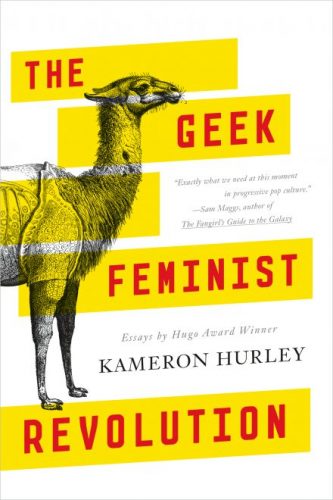It’s difficult to know where to begin when discussing Kameron Hurley’s essay collection, The Geek Feminist Revolution. Heartfelt may be a good word. Expansive may be another. But what keeps coming to my mind, over and again, is important. Vital, even. Especially in today’s America, wherein the once-fringe Gamergate movement has become the de-facto governing philosophy of the country. It sickens me to complete that sentence, but it’s where we are.
Hurley’s book explores nothing new, which is a remarkable enough thought on its own. The problems women and minorities face in the zeitgeist are nothing new, and though things are slowly changing—and we certainly live in a “better” time—we are still unbelievably far from where we need to be. And it feels like we may have just taken a major step backwards.
Hurley’s essays are a no-nonsense, unvarnished look at the status quo, most often through the lens of her personal experiences. Her anger, pain, and passion are evident in her every word, and they suffuse you as you read her essays. It’s frustrating to read, because the very real problems she describes are absurd. Combined with her frank, brutal writing style, the essays achieve their goal easily: to incense the reader. And we should be angry. And we should be galvanized by her words and the words of so many others to take action, to stand beside our fellow humans and say “enough is enough.”
There were more than a few moments while I read the essay collection in which I thought critically about my own experiences. It’s given me pause, and further material for an essay I’ve been considering writing which I’d call something like “On Being an Invisible Minority.” It’d no doubt be controversial, but I worry about writing it, and truth be told, never will. I was able to articulate the thesis of that essay after reading Hurley’s collection, though. So I’ll share the question here: Are we gaslighting individual members of groups for assuming privilege?
I think the core of that question is that privilege is a complicated subject, to say the least. There are so many different qualities that are privileged in our society, but there are also many that disqualify the larger, “superficial” elements of privilege. Just writing that sentence filled me with anxiety. Finishing the thought does, too. Because I’m a white, cis male.
But I’m also Jewish. I’m also a victim of sexual assault. I’m short. I wear glasses. I have a physical disability that resulted from an injury that prevents me from effectively washing the dishes or flipping a pancake without discomfort. I have international experience and dual citizenship. I am multilingual. I am medicated for depression and anxiety, like so many other Americans. I feel like I’m in constant conflict with myself over the obvious privilege and the not-as-obvious struggles. And everywhere I read that those superficial elements of my privilege supersede the things about me I feel have been much more defining in my journey through life.
Most of those things require digging to discover. But walking down the street, I’m way ahead of the game. I know that. So there’s the duality within me that drives me up the wall: I am immensely privileged, and I acknowledge that and want to do my part to change the status quo. And I have struggled, and continue to struggle. But comparing the severity of tragedies and struggles is going down a dark, divisive path. I will never do it. I support the fight of my many brothers and sisters who want nothing more than the dignity of an equal opportunity to succeed, to live without fear of assault and discrimination.
Suffice it to say this: in my pursuit of success as an author of genre fiction, some doors will open more easily for me than for my compatriots of color, women, and the litany of others who suffer this systemic discrimination. It is unacceptable. Hurley’s essays shine a bright light on these issues, and for that, it is a work of great import.
This was a difficult review to write. But The Geek Feminist Revolution was not a difficult book to read. It flows, and Hurley’s righteous fury is appropriate and inspiring. Her contribution to the canon of the fight against discrimination, especially in our corner of the zeitgeist, will stand out as a remarkable moment of commitment. Hurley has cemented herself as a fearless fighter—a woman driven to this end not only by external forces, but an internal strength and perseverance that drives her to shout until she is hoarse, then shout some more. Kameron Hurley, you have written a fantastic collection of essays here. Your work should be considered required reading for anyone who wants to become a “figure” in the genre fiction community.
I’ll be pushing it to every writer I know.
The Geek Feminist Revolution is available on Amazon and directly from the author.

